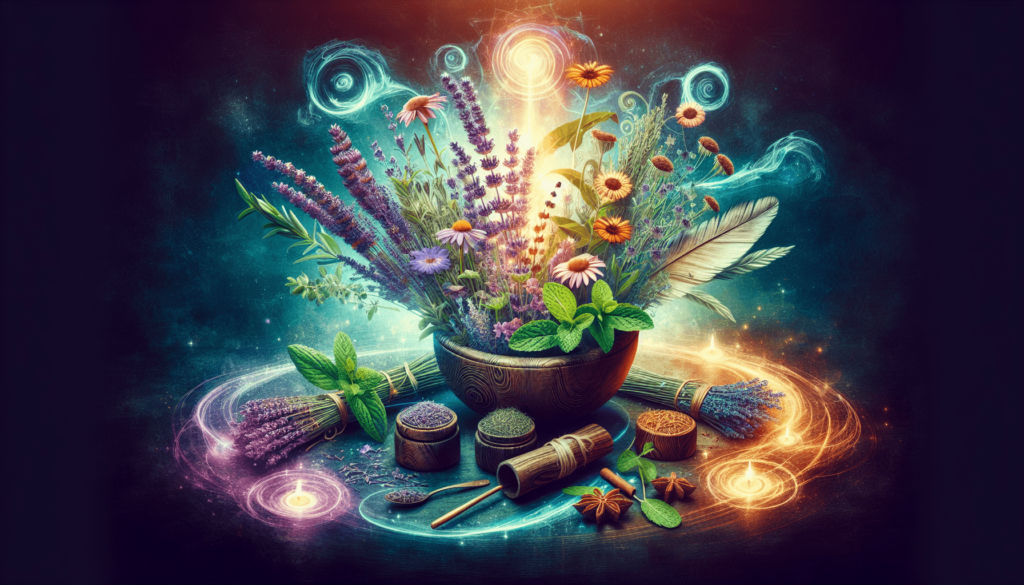So you’ve always been intrigued by the mystical aspects of herbs and their potential impact on spiritual practices. Well, you’re in luck because this article is going to take you on an enlightening journey through the various mystical properties that herbs possess and how they can be harnessed in spiritual rituals. Get ready to delve into the fascinating world of herb magic and discover how these natural wonders can enhance your spiritual connection like never before.

Introduction to Herb in Spiritual Practices
Herb has long been a vital component of spiritual practices across various cultures and belief systems. From ancient rituals to modern-day ceremonies, herbs have played a significant role in connecting individuals to the divine and unlocking mystical properties. In this article, we will explore the rich history and significance of herb in spiritual practices, the types of herbs commonly used, the symbolism and associations they carry, various herbal rituals and practices, combining herbs with other spiritual tools, selecting and preparing herbs for spiritual use, cultural and indigenous perspectives on herb usage, ethical considerations and sustainability, herbal correspondences in different spiritual paths, and personal experiences with herb in spiritual practices.
Defining Herb
Before delving into its spiritual applications, it is important to define what exactly herb refers to in this context. In spiritual practices, herb typically refers to plants or plant parts that are believed to possess special properties or energies. These properties can be harnessed for spiritual purposes such as purification, protection, healing, and enhancing one’s connection to the divine. These herbs are often used in various forms, including dried leaves, resins, flowers, and essential oils.

Historical Significance
Herb has held a significant place in human history, with evidence of its use in spiritual practices dating back thousands of years. Ancient civilizations recognized the power of herbs and their ability to interact with the spiritual realm. The Egyptians, for example, used herbs in their religious ceremonies and believed that they could communicate with the gods through the burning of aromatic plants. Similarly, ancient Greeks and Romans incorporated herbs into their rituals, attributing various mystical properties to different plants.
Spiritual and Mystical Beliefs
Throughout history, humans have attributed spiritual and mystical beliefs to various herbs. These beliefs vary across cultures and spiritual traditions, but often center around the idea that plants possess a connection to the divine or otherworldly realms. Some consider herbs to be sacred beings with their own consciousness, capable of guiding and teaching humans. Others believe that herbs can act as intermediaries, facilitating communication between individuals and deity or spirit. These beliefs form the basis for using herbs in spiritual practices.
Types of Herbs Used in Spiritual Practices
When it comes to spiritual practices, a wide variety of herbs are used for their specific properties and associations. Here are some commonly used herbs and their significance in spiritual contexts:
Sage
Sage is a powerful herb widely recognized for its cleansing and purifying properties. It has been used for centuries in Native American ceremonies and rituals to clear negative energies and restore spiritual balance. Burning sage, also known as smudging, is a common practice to cleanse a space or person and invite positive energy.
Lavender
Lavender is known for its calming and soothing properties. It is often used in spiritual practices to promote relaxation, meditation, and to enhance dreams and divination. Lavender is believed to help open the third eye chakra, facilitating spiritual insight and intuition.
Rosemary
Rosemary is associated with protection, purification, and remembrance. It is commonly used in rituals to create a protective barrier against negative energies and to promote mental clarity and focus. Rosemary can also be used to honor and remember loved ones who have passed away.
Palo Santo
Palo Santo, meaning “holy wood” in Spanish, is a sacred wood used in spiritual practices. Its sweet and grounding aroma is believed to clear away negative energy, uplift the spirits, and enhance meditation and spiritual connection.
Mugwort
Mugwort is often regarded as a herb of psychic power and divination. It is commonly used in dream work and astral travel, believed to enhance vivid dreams and facilitate communication with the spirit realm. Mugwort is also used to purify and protect sacred spaces.
Cedar
Cedar has a long history of spiritual significance in Native American and indigenous traditions. It is believed to carry powerful protective and healing energies, often used in purification rituals and to drive away negative influences. The scent of cedar is said to evoke feelings of grounding and connectedness with nature.
Frankincense
Frankincense has been highly valued since ancient times for its spiritual and medicinal properties. Its rich and aromatic smoke is used to purify and protect sacred spaces, enhance spiritual connection, and promote a peaceful and meditative atmosphere.
Myrrh
Myrrh, like frankincense, is a resin derived from trees and has a history rooted in spiritual practices. It is associated with healing and transformation, often used in rituals for emotional and spiritual purification. Myrrh is believed to aid in deepening meditation and establishing a connection with the divine.
Patchouli
Patchouli is commonly known for its earthy and sensual aroma. In spiritual practices, it is believed to promote grounding, balance, and attracting positive energies. Patchouli is often used in rituals focused on manifestation, abundance, and attracting love.
Sandalwood
Sandalwood is highly regarded for its sacred and spiritual qualities. It is commonly used in incense and essential oils to promote relaxation, deep meditation, and evoke a sense of inner peace. Sandalwood is also associated with spiritual protection and opening the heart chakra.
These are just a handful of the many herbs used in spiritual practices. Each herb carries its own unique properties and associations, making them valuable tools in connecting with the divine and enhancing spiritual experiences. Now that we have explored some of the herbs used in spiritual practices, let us delve into the symbolism and associations they hold.
To be continued…





